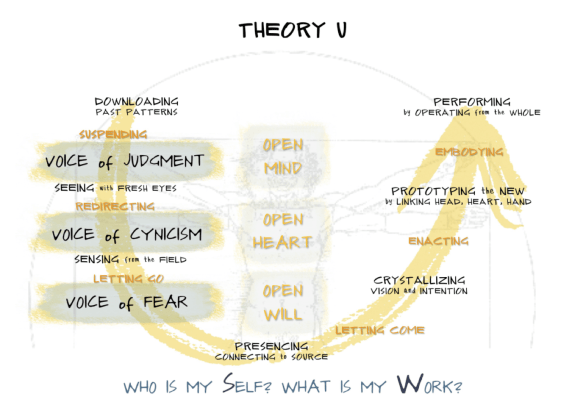Otto Scharmer presents two models that help us understand the dynamics required to moving from and industrial food system to a sustainable food system.
1. Our stages in the way we organise
Otto Scharmer uses his Theory U to illustrate how our societies and economies around the world have evolved through four stages. The first is state-centric, based on hierarchy and centralised control. The next two, free market and social markets, introduced markets and competition and then moderating influences such as NGOs and unions. These three sectors continue to operate in conflict and have exhausted the extent of their value.
Proponents of each suggest that more of their chosen ideology will provide the necessary remedy. So for example, those thinking that the state-centric sector works best will advocate the need for a strong leader (like Putin). The free market ideologues believe the invisible hand of the market will fix things. Social market advocates will want more regulation to redistribute wealth.

Stage 4.0. the Co-creative society
Otto Scharmer points to the emergence of a new societal model – the co-creative society. It is the earlier three sectors, but rather than competing, they are working together – seeing and acting from the whole. In the local food context, we would not have monopolies dominating. The links between food production, consumption, health and a thriving local economy, that are so evident to us, will drive decision making when we get to look at things more holistically. We see and act from a holistic perspective. Otto calls this eco-system awareness.
2. Interacting in ways to co-create
The second very relevant concept is about our listening. Otto Scharmer guides us through the need to suspend the voices of judgement, cynicism and fear to help us get to a space when we can co-create and together “step into the future that wants to emerge”.
As outlined in this graphic, we are able to work together effectively when we open our mind, our heart and our will to connect with others (at the bottom of the U) to enable us to envision and implement new futures.
Training and resources
Otto Scharmer’s book, Leading from the Emerging Future: From Ego-system to Eco-system Economics is a great resource.
Have you done a MOOC yet (Massive Online Open Course)? I have completed Otto Scharmer’s u.Lab course twice now, because it was so good. It is on again in September.
In 2015 a group of Northlanders get together for weekly “coaching circles” as part of this course. If a group of us were to do the course we could create a coaching circle specifically focussing on local food. Please comment if you are interested.
Here is a link to a short self-paced introductory course and to details of the full course.
Otto Scharmer on food systems
Here is an extract from an article by Otto about five sectors, health, education, food, finance and management.
In the agriculture and food sector, we’ve seen a similar evolution: a shift from traditional ways of farming (1.0) to science-based industrial agriculture, focusing on monocultures, maximized output, and profitability (2.0). Now we know that this model has been a disaster not only for the planet (soil erosion, water pollution) but also for people (farmers, workers, supply chains, consumers). The resulting rise of the 3.0 model of sustainable farming practices in part brought us businesses like Whole Foods. Though only a small fraction of their products are locally sourced and organic, many other related brands are an expression of a worldwide movement that has reshaped the ag and food industry over the past decade or two.
But if you talk to the innovators in the green and organic space, many of them are frustrated, despite their amazing successes. They built brands. They built responsible supply chains. They built customer communities. But below the surface, questions loom: Who is my successor? How do we expand? How do we survive massive digitization, big data (automation of ag practices), and ag science or Monsanto-like assaults that threaten the integrity of farms as living eco-systems? Among innovators, there is still too much competition and ego and too little true collaborative transformation aimed at transforming the entire food eco-system. Plus: what really is organic? Just a reduced negative footprint? Or is it something more? More of what? These questions point toward Ag 4.0, which should aim to close the feedback loops across the ecological divide (through circular agriculture), the social divide (through inclusive supply chains), and the spiritual divide (by cultivating the living presence of social-ecological farms).

